Charles E W Bean, Diaries, AWM38 3DRL 606/253/1 - 1918 - 1939 - Part 11
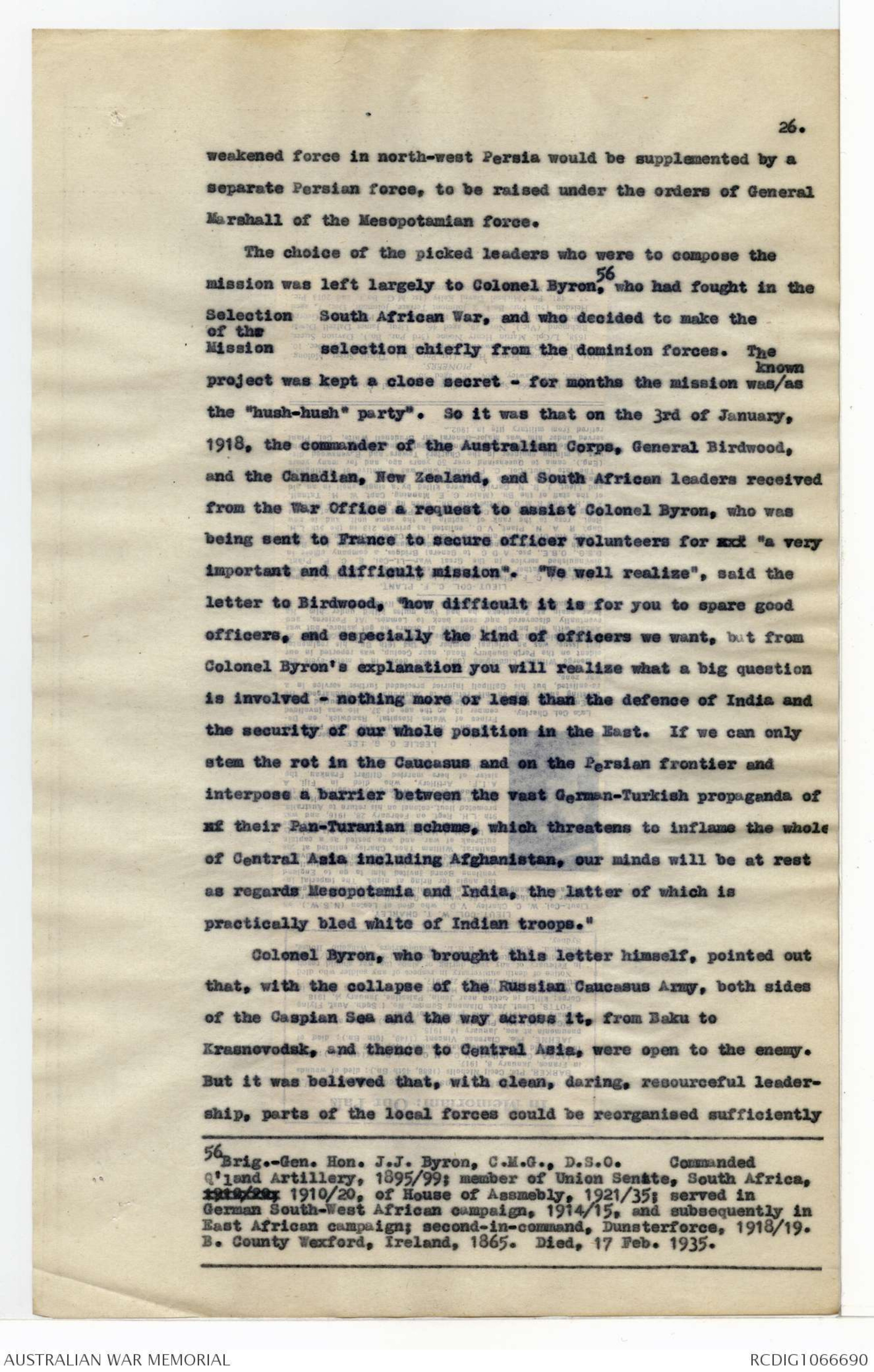
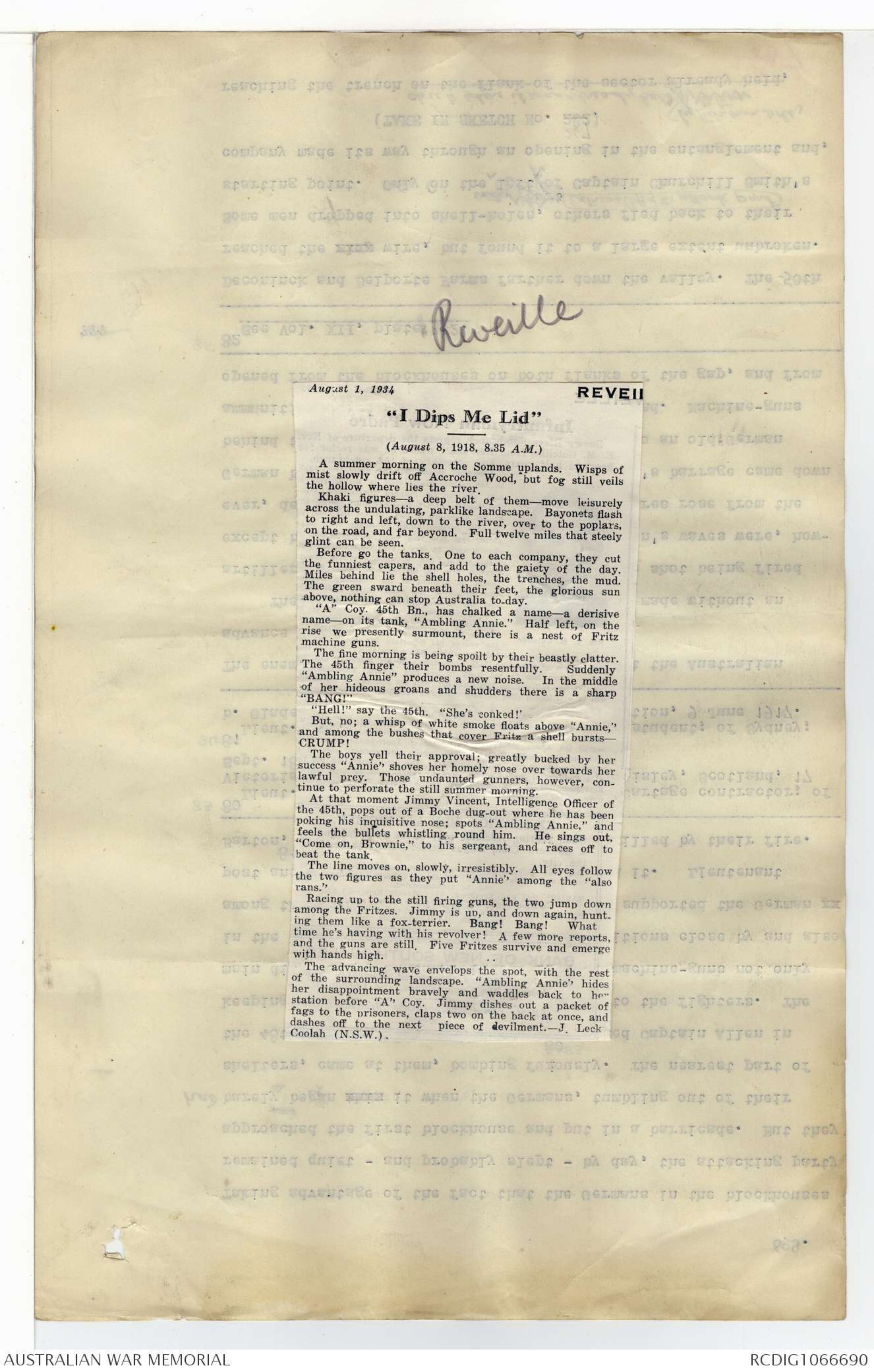
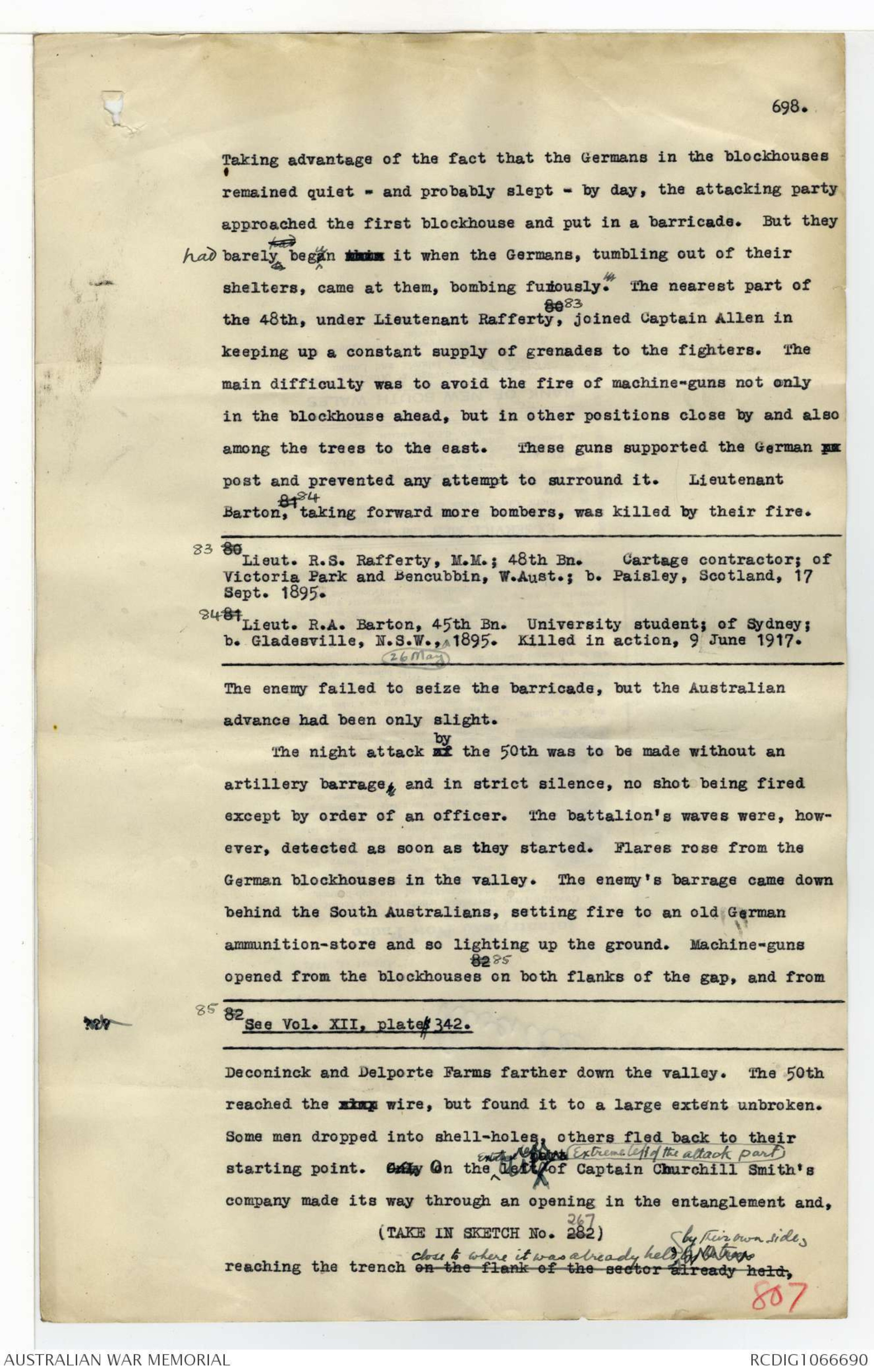
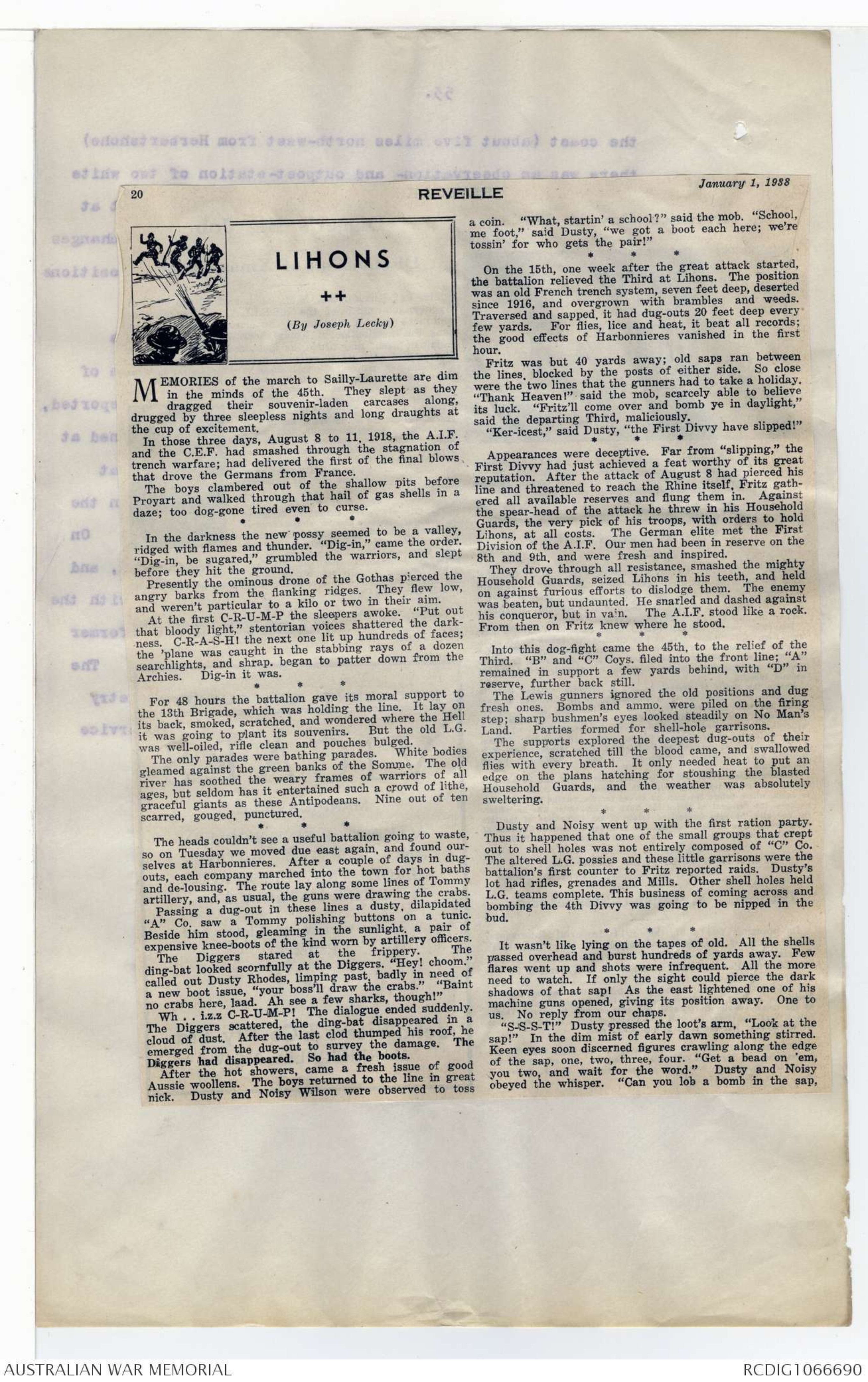
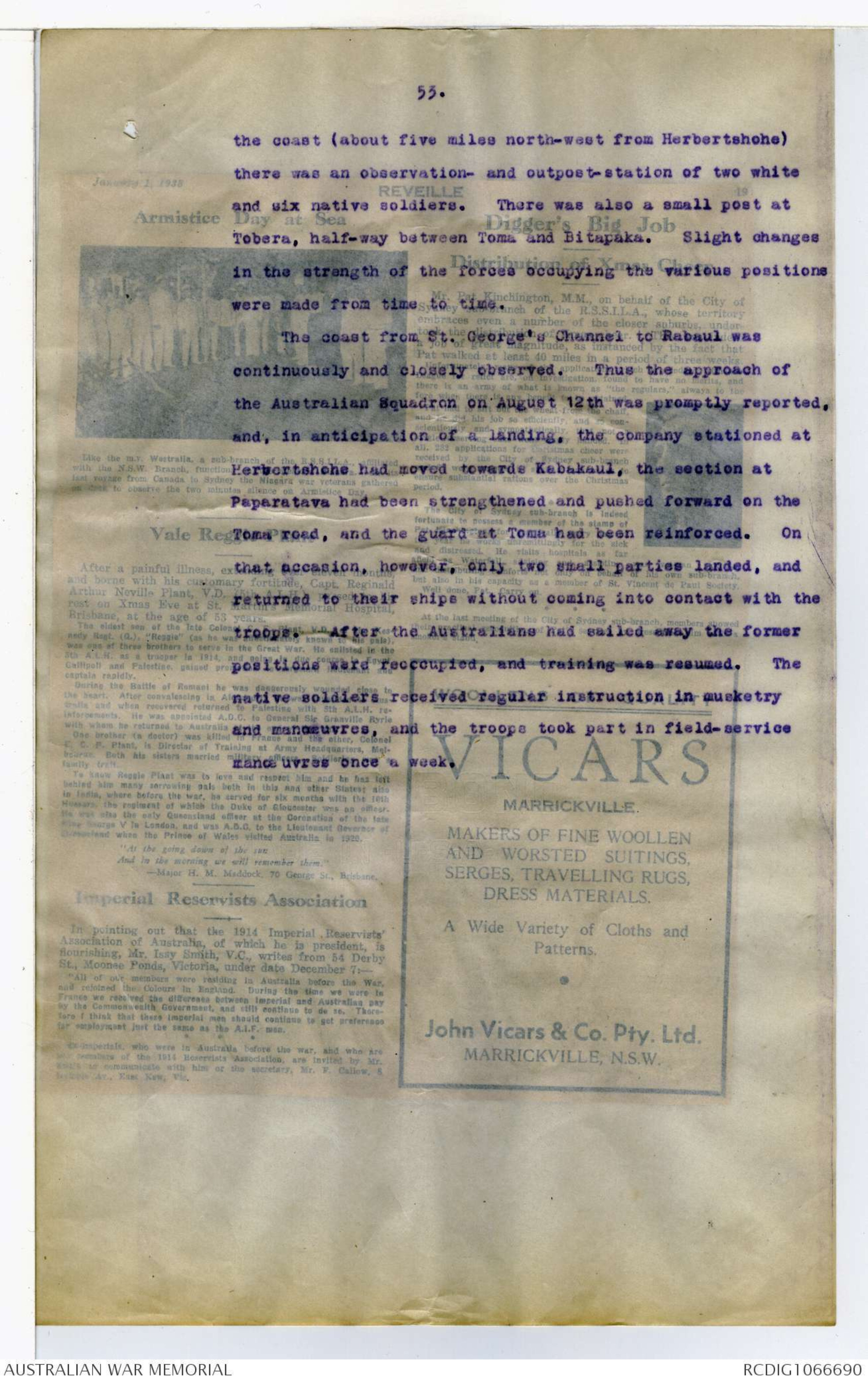
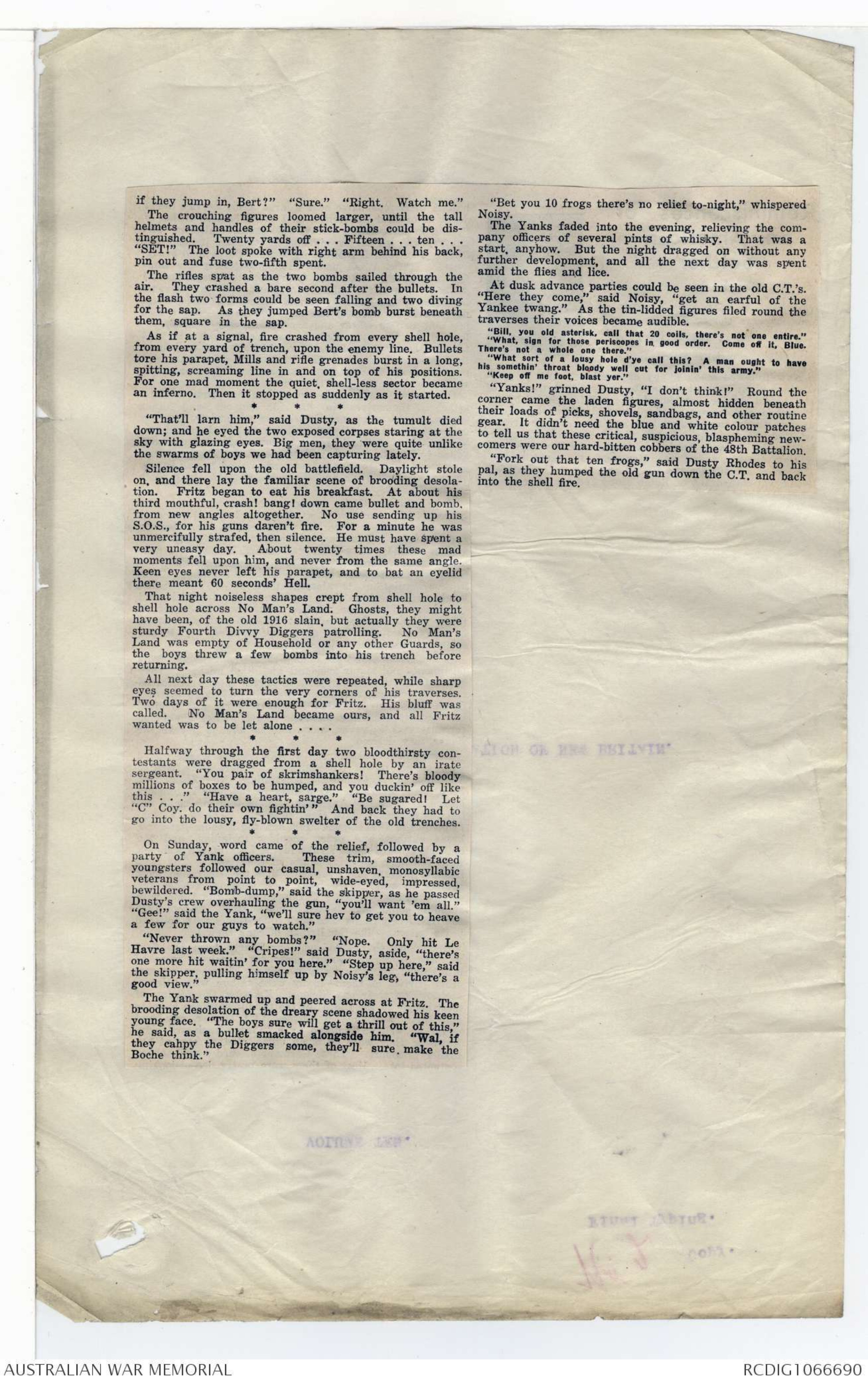
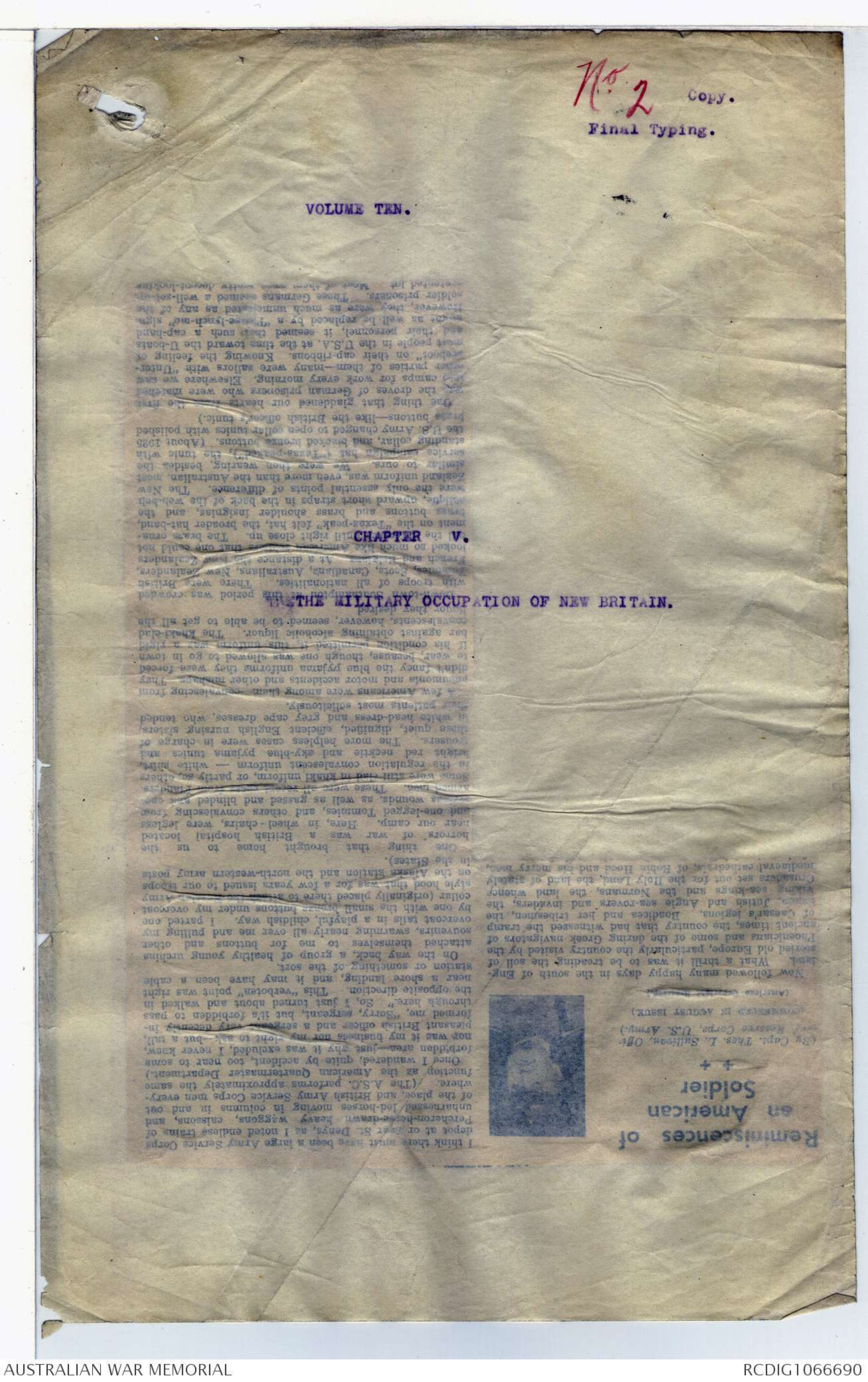
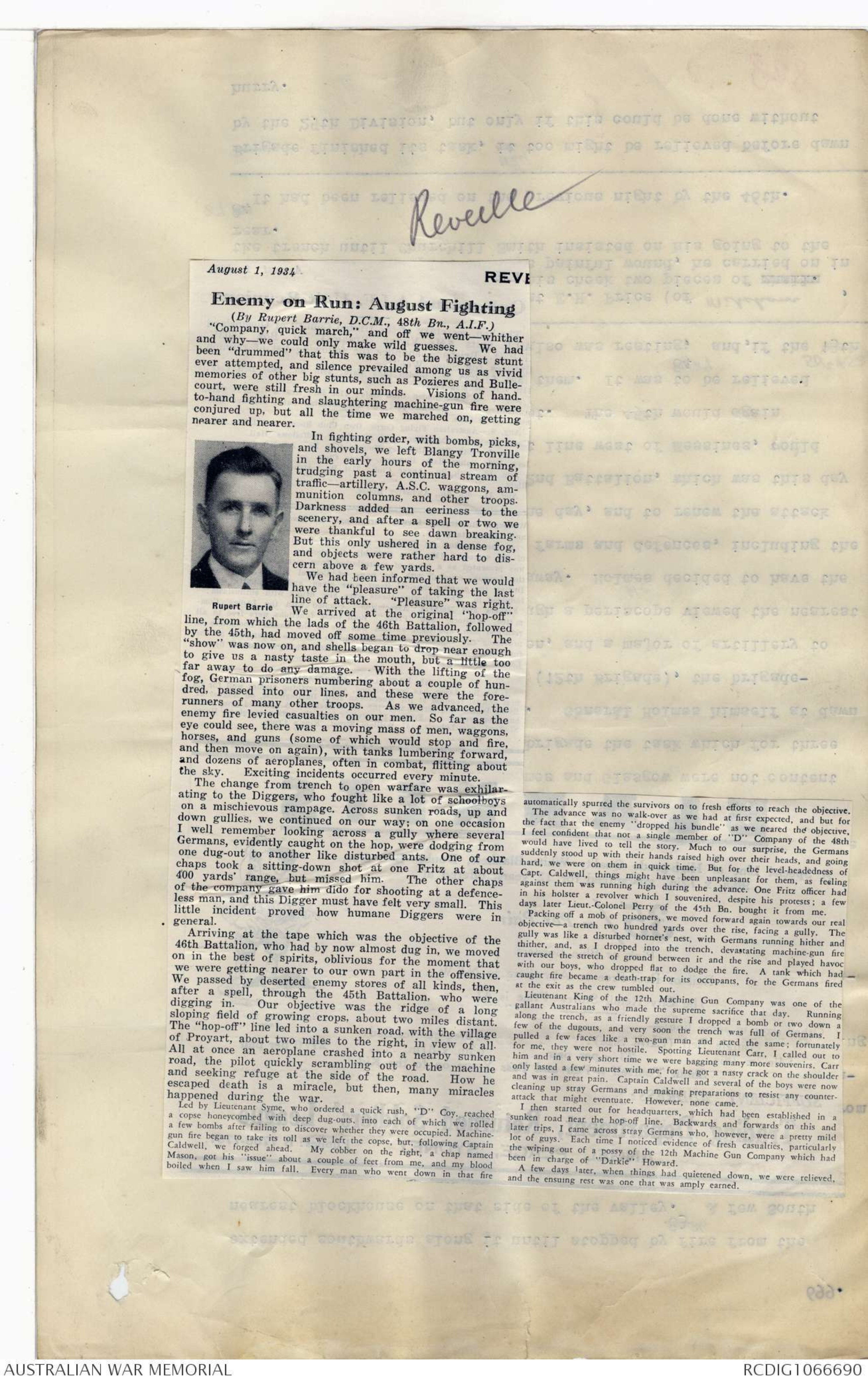
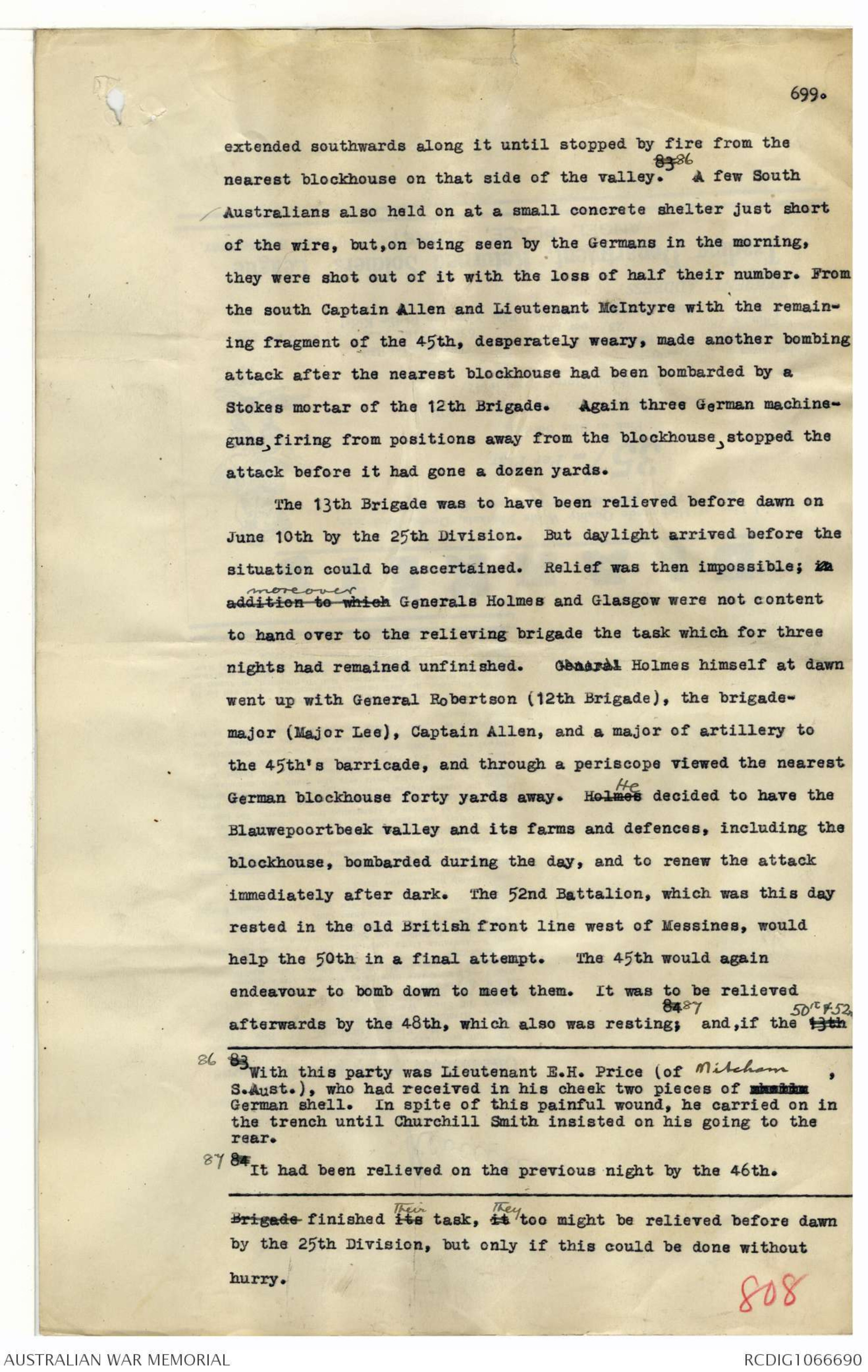
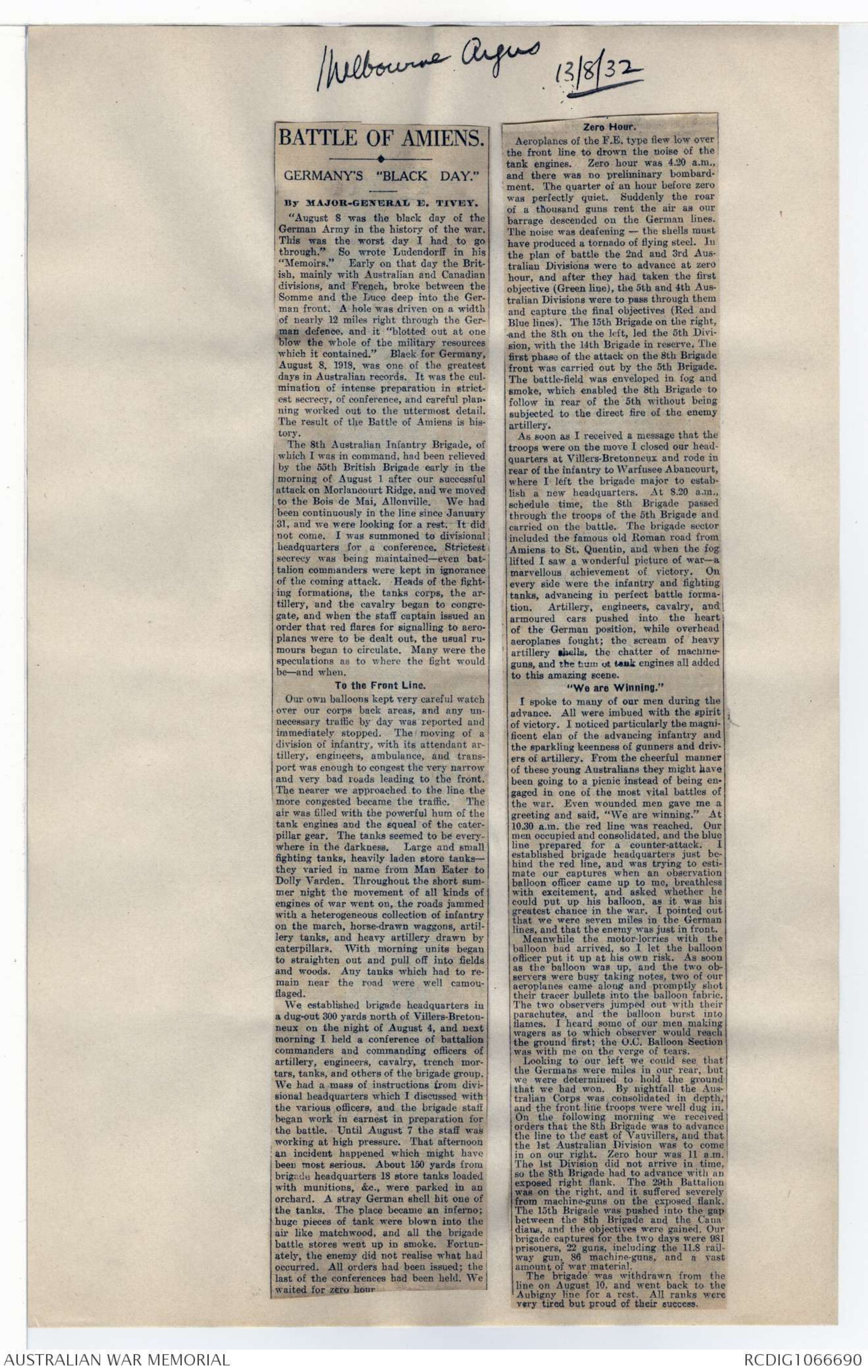
26.
weakened force in north-west Persia would be supplemented by a
separate Persian force, to be raised under the orders of General
Marshall of the Mesopotamian force.
The choice of the picked leaders who were to compose the
mission was left largely to Colonel Byron, 56
Selection of the mission
who had fought in the
South African War, and who decided to make the
selection chiefly from the dominion forces. The
project was kept a close secret - for months the mission was/ known as
the "hush-hush" party. So it was that on the 3rd of January,
1918, the commander of the Australian Corps, General Birdwood,
and the Canadian, New Zealand, and South African leaders received
from the War Office a request to assist Colonel Byron, who was
being sent to France to secure officer volunteers for “a very
important and difficult mission”. “We well realize", said the
letter to Birdwood, how difficult it is for you to spare good
officers, and especially the kind of officers we want, but from
Colonel Byron's explanation you will realize what a big question
is involved - nothing more or less than the defence of India and
the security of our whole position in the East. If we can only
stem the rot in the Caucasus and on the Persian frontier and
interpose a barrier between the vast German-Turkish propaganda ofof their Pan-Turanian scheme, which threatens to inflame the whole
of Central Asia including Afghanistan, our minds will be at rest
as regards Mesopotamia and India, the latter of which is
practically bled white of Indian troops."
Colonel Byron, who brought this letter himself, pointed out
that, with the collapse of the Russian Caucasus Army, both sides
of the Caspian Sea and the way across it, from Baku to
Krasnovodsk, and thence to Central Asia, were open to the enemy.
But it was believed that, with clean, daring, resourceful leadership,
parts of the local forces could be reorganised sufficiently
-------------------------------------------------------------------------
56 Brig.-Gen. Hon. J.J. Byron, C.M.G., D.S.0.
Commanded
Q’land Artillery, 1895/99; member of Union Senate, South Africa,1910/20, 1910/20, of House of Assmebly, 1921/35; served in
German South-West African campaign, 1914/15, and subsequently in
East African campaign; second-in-command, Dunsterforce, 1918/19.
B. County Wexford, Ireland, 1865. Died, 17 Feb. 1935.
---------------------------------------------------------------------------
Reveille
August 1, 1934
REVEII
“I Dips Me Lid"
(August 8, 1918, 8.35 A.M.)
A summer morning on the Somme uplands. Wisps of mist slowly drift off Accroche Wood, but fog still veils the hollow where lies the river.
Khaki figures - a deep belt of them - move leisurely across the undulating, parklike landscape. Bayonets flash to right and left, down to the river, over to the poplars,
on the road, and far beyond. Full twelve miles that steely glint can be seen.
Before go the tanks. One to each company, they cut the capers, and add to the gaiety of the day.
Miles behind lie the shell holes, the trenches, the mud. The green sward beneath their feet, the glorious sun above, nothing can stop Australia to-day.
“A” Coy. 45th Bn., has chalked a name - a derisive
name - on its tank, “Ambling Annie.” Half left, on the
rise we presently surmount, there is a nest of Fritz
machine guns.
The fine morning is being spoilt by their beastly clatter. The 45th finger their bombs resentfully.
Suddenly “Ambling Annie” produces a new noise. In the middle of her hideous groans and shudders there is a sharp "BANG!
"Hell!" say the 45th. "She’s conked!"
But, no; a whisp of white smoke floats above “Annie", and among the bushes that cover Fritz a shell bursts - CRUMP!
The boys yell their approval; greatly bucked by her success “Annie ” shoves her homely nose over towards her lawful prey. Those undaunted gunners, however, continue to perforate the still summer morning.
At that moment Jimmy Vincent, Intelligence Officer of the 45th, pops out of a Boche dug-out where he has been poking his inquisitive nose; spots “Ambling Annie,” and feels the bullets whistling round him. He sings out, “Come on, Brownie,” to his sergeant, and races off to beat the tank.
The line moves on, slowly, irresistibly. All eyes follow the two figures as they put “Annie” among the “also rans."
Racing up to the still firing guns, the two jump down among the Fritzes. Jimmy is up, and down again, hunting them like a fox-terrier. Bang! Bang! What time he’s having with his revolver! A few more reports, and the guns are still. Five Fritzes survive and emerge
with hands high.
The advancing wave envelops the spot, with the rest of the surrounding landscape. “Ambling Annie” hides her disappointment bravely and waddles back to her station before “A” Coy. Jimmy dishes out a packet of fags to the prisoners, claps two on the back at once, and dashes off to the next piece of devilment.—J. Leck
Coolah (N.S.W.).
698.
Taking advantage of the fact that the Germans in the blockhouses
remained quiet - and probably slept - by day, the attacking party
approached the first blockhouse and put in a barricade. But they
had barely bega∧un xxxxx it when the Germans, tumbling out of their
shelters, came at them, bombing furiously. The nearest part of
the 48th, under Lieutenant Rafferty, 80 83 joined Captain Allen in
keeping up a constant supply of grenades to the fighters. The
main difficulty was to avoid the fire of machine-guns not only
in the blockhouse ahead, but in other positions close by and also
among the trees to the east. These guns supported the German xx
post and prevented any attempt to surround it. Lieutenant Barton, 81 84 taking forward more bombers, was killed by their fire.
--------------------------------------------------------------------------------83 80 Lieut. R.S. Rafferty, M.M.; 48th Bn. Cartage contractor; of
Victoria Park and Bencubbin, W.Aust.; b. Paisley, Scotland, 17
Sept. 1895.
84 81 Lieut. R.A. Barton, 45th Bn. University student; of Sydney;
b. Gladesville, N.S.W. 26 May 1895. Killed in action, 9 June 1917.
----------------------------------------------------------------------------------
The enemy failed to seize the barricade, but the Australian advance had been only slight.
The night attack of by the 50th was to be made without an artillery barrage and in strict silence, no shot being fired
except by order of an officer. The battalion's waves were, however,
detected as soon as they started. Flares rose from the
German blockhouses in the valley. The enemy's barrage came down
behind the South Australians, setting fire to an old German ammunition-store and so lighting up the ground. Machine-guns opened from the blockhouses on both flanks of the gap, and from
--------------------------------------------------------------------------------
85 82 See Vol. XII, plates 342.
--------------------------------------------------------------------------------
Deconinck and Delporte Farms farther down the valley.
The 50th reached the xxxxx wire, but found it to a large extent unbroken.
Some men dropped into shell-holes, others fled back to their
starting point. Only On the extremexxof ∧extreme left of the attack part of Captain Churchill Smith's cocpany made its way through an opening in the entanglement and,
(TAKE IN SKETCH No. 282 267)
reaching the trench on the flank of the sector already held, close to where it was already held by their own side,
807
20 REVEILLE January 1, 1938
LIHONS
(By Joseph Lecky)
MEMORIES of the march to Sailly-Laurette are dim
in the minds of the 45th. They slept as they
dragged their souvenir-laden carcases along,
drugged by three sleepless nights and long draughts at
the cup of excitement.
In those three days, August 8 to 11, 1918, the A.I.F
and the C.E.F. had smashed through the stagnation of
trench warfare; had delivered the first of the final blows
that drove the Germans from France.
The boys clambered out of the shallow pits before
Proyart and walked through that hail of gas shells in a
daze; too dog-gone tired even to curse.
In the darkness the new possy seemed to be a valley,
ridged with flames and thunder. “Dig-in,” came the order.
“Dig-in, be sugared,” grumbled the warriors, and slept
before they hit the ground.
Presently the ominous drone of the Gothas pierced the
angry barks from the flanking ridges. They flew low,
and weren’t particular to a kilo or two in their aim.
At the first C-R-U-M-P the sleepers awoke. “Put out
that bloody light,” stentorian voices shattered the darkness.
C-R-A-S-H! the next one lit up hundreds of faces;
the ’plane was caught in the stabbing rays of a dozen
searchlights, and shrap. began to patter down from the
Archies. Dig-in it was.
For 48 hours the battalion gave its moral support to
the 13th Brigade, which was holding the line. It lay on
its back, smoked, scratched, and wondered where the Hell
it was going to plant its souvenirs. But the old L.G.
was well-oiled, rifle clean and pouches bulged.
The only parades were bathing parades. White bodies
gleamed against the green banks of the Somme. The old
river has soothed the weary frames of warriors of all
ages, but seldom has it entertained such a crowd of lithe
graceful giants as these Antipodeans. Nine out of ten
scarred, gouged, punctured.
The heads couldn’t see a useful battalion going to waste
so on Tuesday we moved due east again, and found ourselves
at Harbonnieres. After a couple of days in dugouts,
each company marched into the town for hot baths
and de-lousing. The route lay along some lines of Tommy
artillery, and, as usual, the guns were drawing the crabs.
Passing a dug-out in these lines a dusty, dilapidate
“A” Co. saw a Tommy polishing buttons on a tunic.
Beside him stood, gleaming in the sunlight, a pair of
expensive knee-boots of the kind worn by artillery officers.
The Diggers stared at the frippery. The
ding-bat looked scornfully at the Diggers. “Hey! choom.
called out Dusty Rhodes, limping past badly in need of
a new boot issue, “your boss’ll draw the crabs.” “Baint
no crabs here, laad. Ah see a few sharks, though!”
Wh . . i.z.z C-R-U-M-P! The dialogue ended suddenly
The Diggers scattered, the ding-bat disappeared in a
cloud of dust. After the last clod thumped his roof, he
emerged from the dug-out to survey the damage. The
Diggers had disappeared. So had the boots.
After the hot showers, came a fresh issue of good
Aussie woollens. The boys returned to the line in great
nick. Dusty and Noisy Wilson were observed to toss
a coin. “What, startin’ a school?” said the mob. “School,
me foot," said Dusty, “we got a boot each here; we’re
tossin' for who gets the pair!'
On the 15th, one week after the great attack started,
the battalion relieved the Third at Lihons. The position
was an old French trench system, seven feet deep, deserted
since 1916, and overgrown with brambles and weeds.
the good effects of Harbonnieres vanished in the first
hour.
Fritz was but 40 yards away; old saps ran between
the lines, blocked by the posts of either side. So close
were the two lines that the gunners had to take a holiday.
“Thank Heaven!” said the mob, scarcely able to believe
its luck. “Fritz'll come over and bomb ye in daylight,"
said the departing Third, maliciously.
Traversed and sapped, it had dug-outs 20 feet deep every
few yards. For flies, lice and heat, it beat all records;
“Ker-icest,” said Dusty, “the First Divvy have slipped!'
Appearances were deceptive. Far from “slipping,” the
First Divvy had just achieved a feat worthy of its great
reputation. After the attack of August 8 had pierced his
line and threatened to reach the Rhine itself, Fritz gathered
all available reserves and flung them in. Against
the spear-head of the attack he threw in his Household
Guards, the very pick of his troops, with orders to hold
Lihons, at all costs. The German elite met the First
Division of the A.I.F. Our men had been in reserve on the
8th and 9th, and were fresh and inspired.
They drove through all resistance, smashed the mighty
Household Guards, seized Lihons in his teeth, and held
on against furious efforts to dislodge them. The enemy
was beaten, but undaunted. He snarled and dashed against
his conqueror, but in vain. The A.I.F. stood like a rock.
From then on Fritz knew where he stood.
Into this dog-fight came the 45th, to the relief of the
Third. “B” and “C” Coys. filed into the front line; “A
remained in support a few yards behind, with “D” in
reserve, further back still.
The Lewis gunners ignored the old positions and dug
fresh ones. Bombs and ammo. were piled on the firing
step; sharp bushmen’s eyes looked steadily on No Man's
Land. Parties formed for shell-hole garrisons.
The supports explored the deepest dug-outs of their
experience, scratched till the blood came, and swallowed
flies with every breath. It only needed heat to put an
edge on the plans hatching for stoushing the blasted
Household Guards, and the weather was absolutely
sweltering.
Dusty and Noisy went up with the first ration party.
Thus it happened that one of the small groups that crept
out to shell holes was not entirely composed of “C” Co.
The altered L.G. possies and these little garrisons were the
battalion’s first counter to Fritz reported raids. Dusty's
lot had rifles, grenades and Mills. Other shell holes held
L.G. teams complete. This business of coming across and
bombing the 4th Divvy was going to be nipped in the
bud.
It wasn’t like lying on the tapes of old. All the shells
passed overhead and burst hundreds of yards away. Few
flares went up and shots were infrequent. All the more
need to watch. If only the sight could pierce the dark
shadows of that sap! As the east lightened one of his
machine guns opened, giving its position away. One to
us. No reply from our chaps.
“S-S-S-T!” Dusty pressed the loot's arm, “Look at the
sap!” In the dim mist of early dawn something stirred.
Keen eyes soon discerned figures crawling along the edge
of the sap, one, two, three, four. “Get a bead on 'em
you two, and wait for the word.” Dusty and Noisy
obeyed the whisper. “Can you lob a bomb in the sap,
53.
the coast (about five miles north-west from Herbertshohe)
there was an observation- and outpost-station of two white
and wix native soldiers. There was also a small post at
Tobera, half-way between Toma and Bitapaka. Slight changes
in the strength of the forces occupying the various positions
were made from time to, time.
The coast from St. George's Channel to Rabaul was
continuously and closely observed. Thus the approach of
the Australian Squadron on August 12th was promptly reported,
and, in anticipation of a landing, the company stationed at
Herbertehche had moved towards Kabakaul, the section at
Paparatava had been strengthened and pushed forward on the
Toma road, and the guard at Toma had been reinforced. On
that occasion, however, only two small parties landed, and
returned to their ships without coming into contact with the
troops. After the Australians had sailed away the former
positions were reoccupied, and training was resumed. The
native soldiers received regular instruction in musketry
and manouvres, and the troops took part in field-service
manouvres once a week.
if they jump in, Bert?” “Sure.” “Right. Watch me."
The crouching figures loomed larger, until the tall
helmets and handles of their stick-bombs could be dis¬
nguished. Twenty yards off . . . Fifteen . . . ten . .
ET!” The loot spoke with right arm behind his back,
pin out and fuse two-fifth spent.
The rifles spat as the two bombs sailed through the
air. They crashed a bare second after the bullets. In
the flash two forms could be seen falling and two diving
for the sap. As they jumped Bert’s bomb burst beneath
them, square in the sap.
As if at a signal, fire crashed from every shell hole,
from every yard of trench, upon the enemy line. Bullets
tore his parapet, Mills and rifle grenades burst in a long.
spitting, screaming line in and on top of his positions
For one mad moment the quiet, shell-less sector became
an inferno. Then it stopped as suddenly as it started.
“That'll larn him,” said Dusty, as the tumult died
down; and he eyed the two exposed corpses staring at the
sky with glazing eyes. Big men, they were quite unlike
the swarms of boys we had been capturing lately.
Silence fell upon the old battlefield.
Daylight stole
on, and there lay the familiar scene of brooding desola¬
tion. Fritz began to eat his breakfast. At about his
third mouthful, crash! bang! down came bullet and bomb
from new angles altogether. No use sending up his
S.O.S., for his guns daren’t fire. For a minute he was
unmercifully strafed, then silence. He must have spent a
very uneasy day. About twenty times these mad
moments fell upon him, and never from the same angle
Keen eyes never left his parapet, and to bat an eyelid
there meant 60 seconds' Hell.
That night noiseless shapes crept from shell hole to
shell hole across No Man's Land. Ghosts, they might
have been, of the old 1916 slain, but actually they were
sturdy Fourth Divvy Diggers patrolling. No Man’s
Land was empty of Household or any other Guards, so
the boys threw a few bombs into his trench before
returning.
All next day these tactics were repeated, while sharp
eves seemed to turn the very corners of his traverses
Two days of it were enough for Fritz. His bluff was
called. No Man’s Land became ours, and all Fritz
wanted was to be let alone . . . .
Halfway through the first day two bloodthirsty contestants
were dragged from a shell hole by an irate
sergeant. “You pair of skrimshankers! There's bloody
millions of boxes to be humped, and you duckin’ off like
s . . .” “Have a heart, sarge." “Be sugared! Let
”C" Coy. do their own fightin' ” And back they had to
go into the lousy, fly-blown swelter of the old trenches.
On Sunday, word came of the relief, followed by a
party of Yank officers. These trim, smooth-faced
youngsters followed our casual, unshaven, monosyllabic
veterans from point to point, wide-eyed, impressed
bewildered. “Bomb-dump,” said the skipper, as he passed
Dusty’s crew overhauling the gun, “you’ll want ’em all.
“Gee!” said the Yank, “we’ll sure hev to get you to heave
a few for our guys to watch.
“Never thrown any bombs?” “Nope. Only hit Le
Havre last week.” “Cripes!” said Dusty, aside, “there's
one more hit waitin' for you here.” “Step up here,” said
the skipper, pulling himself up by Noisy’s leg, “there's a
good view."
The Yank swarmed up and peered across at Fritz. The
brooding desolation of the dreary scene shadowed his keen
voung face. “The boys sure will get a thrill out of this,"
he said, as a bullet smacked alongside him. “Wal, it
they cahpy the Diggers some, they'll sure, make the
Boche think.'
“Bet you 10 frogs there’s no relief to-night,” whispered
Noisy.
The Yanks faded into the evening, relieving the company
officers of several pints of whisky. That was a
start, anyhow. But the night dragged on without any
further development, and all the next day was spent
amid the flies and lice.
At dusk advance parties could be seen in the old C.T.’s.
“Here they come,” said Noisy, “get an earful of the
Yankee twang.” As the tin-lidded figures filed round the
traverses their voices became audible.
“Bill, you old asterisk, call that 20 coils, there's not one entire."
“What, sign for those periscopes in good order. Come off it, Blue.
here’s not a whole one there.
"What sort of a lousy hole d’ye call this? A man ought to have
s somethin’ throat bloody well cut for joinin’ this army."
“Keep off me foot, blast yer.
“Yanks!" grinned Dusty, “I don't think!” Round the
corner came the laden figures, almost hidden beneath
their loads of picks, shovels, sandbags, and other routine
gear. It didn’t need the blue and white colour patches
to tell us that these critical, suspicious, blaspheming new-
comers were our hard-bitten cobbers of the 48th Battalion.
“Fork out that ten frogs,” said Dusty Rhodes to his
pal, as they humped the old gun down the C.T. and back
into the shell fire.
No. 2 Copy.
Final Typing.
VOLUME TEN.
CHAPTER V.
THE MILITARY OCCUATION OF NEW BRITAIN.
Reveille
August 1, 1934.
REVI
Enemy on Run: August Fighting
(By Rupert Barrie, D.C.M., 48th Bn., A.I.F.)
“Company, quick march," and off we went—whither
and why—we could only make wild guesses. We had
been “drummed” that this was to be the biggest stunt
ever attempted, and silence prevailed among us as vivid
memories of other big stunts, such as Pozieres and Bullecourt, were still fresh in our minds. Visions of hand-
to-hand fighting and slaughtering machine-gun fire were
conjured up, but all the time we marched on, getting
nearer and nearer.
In fighting order, with bombs, picks,
and shovels, we left Blangy Tronville
in the early hours of the morning
trudging past a continual stream of
traffic—artillery, A.S.C. waggons, ammunition
columns, and other troops.
Darkness added an eeriness to the
scenery, and after a spell or two we
were thankful to see dawn breaking.
But this only ushered in a dense fog,
and objects were rather hard to discern
above a few yards.
We had been informed that we would
have the “pleasure" of taking the last
line of attack. "Pleasure" was right.
We arrived at the original "hop-off"
line, from which the lads of the 46th Battalion, followed
by the 45th, had moved off some time previously. The
“show" was now on, and shells began to drop near enough
to give us a nasty taste in the mouth, but a little too
far away to do any damage. With the lifting of the
fog, German prisoners numbering about a couple of hundred, passed into our lines, and these were the forerunners
of many other troops. As we advanced, the
enemy fire levied casualties on our men. So far as the
eye could see, there was a moving mass of men, waggons,
horses, and guns (some of which would stop and fire,
and then move on again), with tanks lumbering forward
and dozens of aeroplanes, often in combat, flitting about
the sky. Exciting incidents occurred every minute.
The change from trench to open warfare was exhilarating
to the Diggers, who fought like a lot of schoolboys
on a mischievous rampage. Across sunken roads, up and
down gullies, we continued on our way; on one occasion
I well remember looking across a gully where several
Germans, evidently caught on the hop, were dodging fron
one dug-out to another like disturbed ants. One of our
chaps took a sitting-down shot at one Fritz at about
400 yards' range, but missed him. The other chaps
of the company gave him dido for shooting at a defenceless man, and this Digger must have felt very small. This
little incident proved how humane Diggers were in
general.
Arriving at the tape which was the objective of the
46th Battalion, who had by now almost dug in, we moved
on in the best of spirits, oblivious for the moment that
we were getting nearer to our own part in the offensive.
We passed by deserted enemy stores of all kinds, then,
after a spell, through the 45th Battalion, who were
digging in. Our objective was the ridge of a long
sloping field of growing crops, about two miles distant
The “hop-off” line led into a sunken road, with the village
of Proyart, about two miles to the right, in view of all.
All at once an aeroplane crashed into a nearby sunken
road, the pilot quickly scrambling out of the machine
and seeking refuge at the side of the road. How he
escaped death is a miracle, but then, many miracles
happened during the war.
Led by Lieutenant Syme, who ordered a quick rush, “D" Coy., reached
a copse honeycombed with deep dug-outs, into each of which we rolled
a few bombs after failing to discover whether they were occupied. Machinegun
fire began to take its toll as we left the copse, but, following Captain
Caldwell, we forged ahead. My cobber on the right, a chap named
Mason, got his "issue" about a couple of feet from me, and my blood
boiled when I saw him fall. Every man who went down in that fire
automatically spurred the survivors on to fresh efforts to reach the objective.
The advance was no walk-over as we had at first expected, and but for
the fact that the enemy “dropped his bundle” as we neared the objective.
I feel consident that not a single member of “D' Company of the 48th
would have lived to tell the story. Much to our surprise, the Germans
suddenly stood up with their hands raised high over their heads, and going
hard, we were on them in quick time. But for the level-headedness of
Capt. Caldwell, things might have been unpleasant for them, as feeling
against them was running high during the advance. One Fritz officer had
in his holster a revolver which I souvenired, despite his protests; a few
days later Lieut.-Colonel Perry of the 45th Bn. bought it from me.
Packing off a mob of prisoners, we moved forward again towards our real
objective—a trench two hundred yards over the rise, facing a gully. The
gully was like a disturbed hornet's nest, with Germans running hither and
thither, and, as I dropped into the trench, devastating machinegun fire
traversed the stretch of ground between it and the rise and played havoc
with our boys, who dropped flat to dodge the fire. A tank which had
caught fire became a death-trap for its occupants, for the Germans fired
at the exit as the crew tumbled out.
Lieutenant King of the 12th Machine Gun Company was one of the
gallant Australians who made the supreme sacrifice that day. Running
along the trench, as a friendly gesture I dropped a bomb or two down a
few of the dugouts, and very soon the trench was full of Germans. I
pulled a few faces like a two-gun man and acted the same; fortunately
for me. they were not hostile. Spotting Lieutenant Carr. I called out to
him and in a very short time we were bagging many more souvenirs. Carr
only lasted a few minutes with me. for he got a nasty crack on the shoulder
and was in great pain. Captain Caldwell and several of the boys were now
cleaning up stray Germans and making preparations to resist any counter
attack that might eventuate. However, none came.
I then started out for headquarters, which had been established in
sunken road near the hop-off line. Backwards and forwards on this and
later trips. I came across stray Germans who, however, were a pretty mild
lot of guys. Each time I noticed evidence of fresh casualties, particularly
the wiping out of a possy of the 12th Machine Gun Company which had
been in charge of "Darkie" Howard.
A few days later, when things had quietened down, we were relieved,
and the ensuing rest was one that was amply earned.
699.
extended southwards along it until stopped by fire from the
nearest blockhouse on that side of the valley.89 86 A few South
Australians also held on at a small concrete shelter just short
of the wire, but,on being seen by the Germans in the morning,
they were shot out of it with the loss of half their number. From
the south Captain Allen and Lieutenant McIntyre with the remaining
fragment of the 45th, desperately weary, made another bombing
attack after the nearest blockhouse had been bombarded by a
Stokes mortar of the 12th Brigade. Again three German machine-
guns, firing from positions away from the blockhouse, stopped the
attack before it had gone a dozen yards.
The 13th Brigade was to have been relieved before dawn on
June 10th by the 25th Division. But daylight arrived before the
situation could be ascertained. Relief was then impossible; inaddition to which moreover Generals Holmes and Glasgow were not content
to hand over to the relieving brigade the task which for three
nights had remained unfinished. General Holmes himself at dawn
went up with General Robertson (12th Brigade), the brigade-
major (Major Lee), Captain Allen, and a major of artillery to
the 45th's barricade, and through a periscope viewed the nearest
German blockhouse forty yards away. Holmes decided to have the
Blauwepoortbeek valley and its farms and defences, including the
blockhouse, bombarded during the day, and to renew the attack
immediately after dark. The 52nd Battalion, which was this day
rested in the old British front line west of Messines, would
help the 50th in a final attempt. The 45th would again
endeavour to bomb down to meet them. It was to be relieved
afterwards by the 48th, which also was resting;84 87 and,if the 50th & 52nd 13th
86 83 With this party was Lieutenant E.H. Price (of Mitcham,
S.Aust.), who had received in his cheek two pieces of xxxxxx
German shell. In spite of this painful wound, he carried on in
the trench until Churchill Smith insisted on his going to the
rear.
87 84 It had been relieved on the previous night by the 46th.Brigade finished its Their task, They too might be relieved before dawn
by the 25th Division, but only if this could be done without
hurry.
808
Melbourne Argus
13/8/32
BATTLE OF AMIENS.
GERMANYS "BLACK DAY."
By MAJOR-GENERAL E. TIVEY.
“August 8 was the black day of the
German Army in the history of the war.
This was the worst day I had to go
through." So wrote Ludendorff in his
“Memoirs.” Early on that day the British,
mainly with Australian and Canadian
divisions, and French, broke between the
Somme and the Luce deep into the German
front. A hole was driven on a width
of nearly 12 miles right through the German
defence, and it “blotted out at one
blow the whole of the military resources
which it contained.” Black for Germany,
August 8. 1918, was one of the greatest
days in Australian records. It was the culmination
of intense preparation in strictest
secrecy, of conference, and careful planning
worked out to the uttermost detail.
The result of the Battle of Amiens is history.
The 8th Australian Infantry Brigade, of
which I was in command, had been relieved
by the 55th British Brigade early in the
morning of August 1 after our successful
attack on Morlancourt Ridge, and we moved
to the Bois de Mai, Allonville. We had
been continuously in the line since January
31, and we were looking for a rest. It did
not come. I was summoned to divisional
headquarters for a conference. Strictest
secrecy was being maintained—even battalion
commanders were kept in ignorance
of the coming attack. Heads of the fighting
formations, the tanks corps, the artillery,
and the cavalry began to congregate,
and when the staff captain issued an
order that red flares for signalling to aeroplanes
were to be dealt out, the usual rumours
began to circulate. Many were the
speculations as to where the fight would
be—and when.
To the Front Line.
Our own balloons kept very careful watch
over our corps back areas, and any un¬
necessary traffic by day was reported and
immediately stopped. The moving of a
division of infantry, with its attendant artillery,
engineers, ambulance, and transport
was enough to congest the very narrow
and very bad roads leading to the front.
The nearer we approached to the line the
more congested became the traffic. The
air was filled with the powerful hum of the
tank engines and the squeal of the caterpillar
gear. The tanks seemed to be everywhere
in the darkness. Large and small
fighting tanks, heavily laden store tanks—
they varied in name from Man Eater to
Dolly Varden. Throughout the short summer
night the movement of all kinds of
engines of war went on, the roads jammed
with a heterogeneous collection of infantry
on the march, horse-drawn waggons, artillery
tanks, and heavy artillery drawn by
caterpillars. With morning units began
to straighten out and pull off into fields
and woods. Any tanks which had to re¬
main near the road were well camouflaged.
We established brigade headquarters in
a dug-out 300 yards north of Villers-Bretonneux
on the night of August 4, and next
morning I held a conference of battalion
commanders and commanding officers of
artillery, engineers, cavalry, trench mortars,
tanks, and others of the brigade group.
We had a mass of instructions from divisional
headquarters which I discussed with
the various officers, and the brigade staff
began work in earnest in preparation for
the battle. Until August 7 the staff was
working at high pressure. That afternoon
an incident happened which might have
been most serious. About 150 yards from
brigade headquarters 18 store tanks loaded
with munitions, &c., were parked in an
orchard. A stray German shell hit one of
the tanks. The place became an inferno;
huge pieces of tank were blown into the
air like matchwood, and all the brigade
battle stores went up in smoke. Fortunately,
the enemy did not realise what had
occurred. All orders had been issued; the
last of the conferences bad been held. We
waited for zero hour
Zero Hour.
Aeroplanes of the F.E. type flew low over
the front line to drown the noise of the
tank engines. Zero hour was 4.20 a.m.,
and there was no preliminary bombardment.
The quarter of an hour before zero
was perfectly quiet. Suddenly the roar
of a thousand guns rent the air as our
barrage descended on the German lines.
The noise was deafening — the shells must
have produced a tornado of flying steel. In
the plan of battle the 2nd and 3rd Australian
Divisions were to advance at zero
hour, and after they had taken the first
objective (Green line), the 5th and 4th Australian
Divisions were to pass through them
and capture the final objectives (Red and
Blue lines). The 15th Brigade on the right,
and the 8th on the left, led the 5th Division,
with the 14th Brigade in reserve. The
first phase of the attack on the 8th Brigade
front was carried out by the 5th Brigade.
The battle-field was enveloped in fog and
smoke, which enabled the 8th Brigade to
follow in rear of the 5th without being
subjected to the direct fire of the enemy
artillery.
As soon as I received a message that the
troops were on the move I closed our headquarters
at Villers-Bretonneux and rode in
rear of the infantry to Warfusee Abancourt,
where I left the brigade major to establish
a new headquarters. At 8.20 a.m.,
schedule time, the 8th Brigade passed
through the troops of the 5th Brigade and
carried on the battle. The brigade sector
included the famous old Roman road from
Amiens to St. Quentin, and when the fog
lifted I saw a wonderful picture of war—a
marvellous achievement of victory. On
every side were the infantry and fighting
tanks, advancing in perfect battle formation.
Artillery, engineers, cavalry, and
armoured cars pushed into the heart
of the German position, while overhead
aeroplanes fought; the scream of heavy
artillery shells, the chatter of machine-guns,
and the hum of tank engines all added
to this amazing scene.
“We are Winning."
I spoke to many of our men during the
advance. All were imbued with the spirit
of victory. I noticed particularly the magnificent
elan of the advancing infantry and
the sparkling keenness of gunners and drivers
of artillery. From the cheerful manner
of these young Australians they might have
been going to a picnic instead of being engaged
in one of the most vital battles of
the war. Even wounded men gave me a
greeting and said, “We are winning.” At
10.30 a.m. the red line was reached. Our
men occupied and consolidated, and the blue
line prepared for a counter-attack. I
established brigade headquarters just behind
the red line, and was trying to estimate
our captures when an observation
balloon officer came up to me, breathless
with excitement, and asked whether he
could put up his balloon, as it was his
greatest chance in the war. I pointed out
that we were seven miles in the German
lines, and that the enemy was just in front.
Meanwhile the motor-lorries with the
balloon bad arrived, so I let the balloon
officer put it up at his own risk. As soon
as the balloon was up, and the two observers
were busy taking notes, two of our
aeroplanes came along and promptly shot
their tracer bullets into the balloon
The two observers jumped out with their
parachutes, and the balloon burst into
flames. I heard some of our men making
wagers as to which observer would reach
the ground first; the O.C. Balloon Section
was with me on the verge of tears.
Looking to our left we could see that
the Germans were miles in our rear, but
we were determined to hold the ground
that we had won. By nightfall the Australian
Corps was consolidated in depth
and the front line troops were well dug in
On the following morning we received
orders that the 8th Brigade was to advance
the line to the east of Vauvillers, and that
the 1st Australian Division was to come
in on our right. Zero hour was 11 a.m.
The 1st Division did not arrive in time,
so the 8th Brigade had to advance with an
exposed right flank. The 29th Battalion
was on the right, and it suffered severely
from machine-guns on the exposed flank.
The 15th Brigade was pushed into the gap
between the 8th Brigade and the Canadians,
and the objectives were gained. Our
brigade captures for the two days were 981
prisoners, 22 guns, including the 11.8 Railway
gun, 86 Machine-guns, and a vast
amount of war material.
The brigade was withdrawn from the
line on August 10, and went back to the
Aubigny line for a rest. All ranks were
very tired but proud of their success.
 Sam scott
Sam scottThis transcription item is now locked to you for editing. To release the lock either Save your changes or Cancel.
This lock will be automatically released after 60 minutes of inactivity.